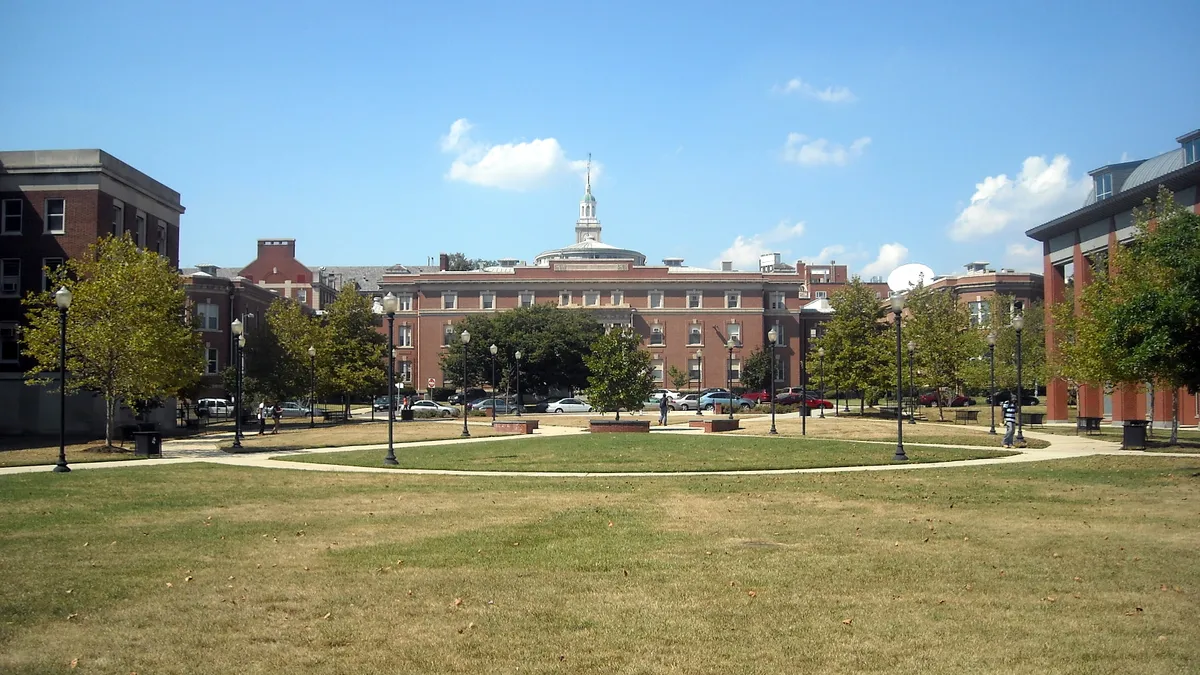Dive Brief:
- Howard University announced Wednesday that it has received the largest gift in its 153-year history: a $10 million donation to endow an existing program designed to help underrepresented students earn a STEM doctorate.
- Started in 2017, the Bison STEM Scholars Program has been renamed after the Karsh family, which made the donation. It covers all or most of four years of tuition, fees and room and board for undergraduates who commit to pursuing doctoral studies in STEM fields, depending on their family's income.
- The news comes as more colleges attempt similar programs and as donors eye historically black institutions, many of which are struggling to improve their enrollment and financial positions.
Dive Insight:
The Karsh STEM Scholars Program is modeled after the Meyerhoff Scholars Program started by the University of Maryland, Baltimore County more than three decades ago. It has been replicated elsewhere, including at Penn State and the University of North Carolina-Chapel Hill, and similar programs are expected to launch this summer at two University of California System campuses.
They typically offer undergraduates a scholarship along with advising, mentoring and research opportunities, as well as a summer bridge program to help them get acquainted with the campus. The programs mean to increase diversity in STEM fields while acknowledging the barriers black students in particular face when it comes to finishing a degree.
Howard, which is based in Washington, D.C., and enrolled 9,139 students in the fall of 2018, has contributed to that goal. It had more black graduates who went on to earn a STEM doctorate between 2013 and 2017 than any other institution in the country, according to data from the National Center for Science and Engineering Statistics (NCSES). It was followed by Spelman College, a historically black women's institution.
HBCUs have contributed an outsized share of doctorate recipients in science and engineering fields, NCSES noted. While HBCUs accounted for just 15% of bachelor's degrees awarded to black students in 2016, one-quarter of science and engineering doctoral graduates from 2013 to 2017 held a bachelor's degree from an HBCU.
Still research shows that a gap persists in underrepresented students' attainment in STEM fields. In 2016, 13.8% of black doctoral degree recipients earned STEM degrees, the smallest share of groups tracked in a report last year from the American Council on Education.
So far, about 30 students have joined Howard's Karsh program each year.
Howard's gift comes as HBCUs bring in some of their biggest donations yet, and they focus on more than STEM. Morehouse College's 2019 graduating class had its student loans wiped out by a grant from billionaire donor Robert Smith. This followed a $1.5 million donation from Smith earlier that year, covering scholarships and a park.
Retired NBA player Charles Barkley has donated at least $4 million across four HBCUs, including Morehouse, in the last four years. In December, Howard got $4 million for its STEM scholars program. And in late 2018, Spelman College nabbed $30 million to build an arts center, its largest gift yet from living donors.
Still, donors tend to favor HBCUs that are on better financial footing.
By and large, the sector is struggling with enrollment and financing concerns, though many HBCUs are getting creative to stay viable, Delece Smith-Barrow, senior editor at The Hechinger Report, wrote in an op-ed for The New York Times last fall.
New initiatives may help. UNCF is giving four HBCUs $300,000 over a two-year period each to develop centers that combine the liberal arts and fields such as STEM, health care, education and finance. The move follows earlier calls for struggling HBCUs to find ways to gain a competitive advantage over other institutions.
Of the $10 million gift to Howard, $8.9 million is for the Karsh program and $1.13 million will support a scholarship program for underrepresented students.










